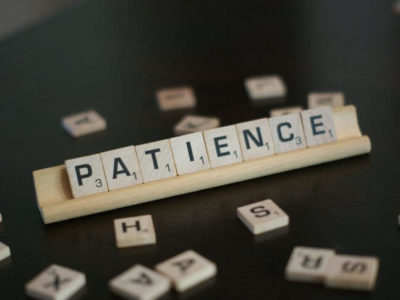Before college, I only knew the Catholic school life. Though plaid kilts didn’t follow me to college, I still wanted to attend a Catholic institution. Despite the University of San Diego’s Catholic affiliation, students don’t have to practice Catholicism, but the community’s focus on change-making really attracted me. When the Lent season fully sprung at USD, I decided to turn a new leaf: I wanted to focus on bettering myself through patience. What I didn’t expect?
I didn’t expect the change that learning how to be more patient created not only in my life but in my surroundings.
The Realization

Throughout my life, the word “virtue” made an appearance time and time again. In elementary school, kindergarteners learned the Golden Rule: “Do to others what you want them to do it you.” When I got to middle school, virtues really just became something that you had to write down on a little notecard 10 minutes before religion class because you forgot to study.
I thought it would’ve been the same in high school… yet as soon as I got there, it seemed to be different. My teachers attempted to dive into the meaning of the word. From my experience in high school, acting virtuous was never really an option when all anyone cared about was the social things. Everyone knows about it but not many people really know exactly what virtue really means.
Going out of your way to act a certain way takes a lot of effort. As a busy college student, I naturally look for ways to get out of putting a lot of effort in things I know I don’t have to. Since I’m already doing so much, my pushing it to the side doesn’t seem bad. Something I choose to think about happens to be how I act towards people. I am confident and therefore I don’t make an effort to change who I am.
Why I Needed Patience in My Life

Sometimes, though, you should take a step back and reevaluate your life came… no matter how challenging. I wanted a challenge. By the end of first week of Lent, I decided working on patience would really help me. The capability to accept and tolerate trouble, suffering or delay without getting angry or upset defines patience.
Why did I choose patience? After a week of Googling virtues and doing some soul searching, the hardest virtue for me to perfect or practice happened to be patience. My parents taunted me with the sayings, “Patience is a virtue” or “Good things come to those who wait” as a child. Finally showing them I understand and trying to practice those ideals seemed like a good way to spend the next two weeks.
The first week of Lent was anything but easy. As I tried to live my life with patience in mind, little daily tasks I performed full of tiny irritants were due to my real lack of patience. Simple things like tapping my foot on the ground in aggravation because the line to the Blue Spoon happened to be too long shows how easily angered I could be.
I even realized that my constant need to move did made me incapable of stopping and smelling the roses at USD’s beautiful campus from time to time. Week one taught me about the little things that I needed to control in order to truly call myself a patient person.
What Meditation Taught Me

Every week introduced something new. The second week started with me trying to meditate. I struggled with meditation my whole life. Typically I stay clear of anything that requires me to patiently sit for an hour in complete silence and “reflect” on myself. I realized I needed help from others or I would get nowhere. I texted my old cheer coach—a meditation junkie—to ask him to send me recommendations about certain meditation apps.
After downloading the Headspace app (he gave me a free demo—oh, what luck) it took me two days to even open it. I dreaded sitting there in silence and patiently trying to uncover some hidden part of myself throughout meditation. I finally opened the app and was pleasantly rewarded every few days after meditative sessions to unlock my mind. Though taking the time out of my busy day challenged me, I took away something valuable during my meditation: acting patient and discovering self-awareness go hand in hand. These two virtues connect with one another. If you do not take the time to patiently listen to what you need or just calm down from the outside pressures, you will never unlock the virtue of self-awareness.
Meditation really helped with my stress. As cliché as it sounds, taking five or 10 minutes to take a break from the daily stress of papers and homework makes you appreciate life a little more. Meditation takes a lot of practice and for a first-time meditator, guiding a meditation session by yourself takes a nearly impossible turn. Having a resource, like an app, to aid you really makes it easy to stop worrying about doing it right and actually try to meditate.
How Everything Changed

The last week of Lent really captured the bigger picture. For my sorority, Big-Little Week happens to be the most anticipated week for new members. One week every year, a “big” (an older girl in the sorority) showers her “little” (new member in the sorority) with presents and special events before revealing themselves at the end of the week. The key for surviving the exciting tradition? Practicing patience. As a new member of the sorority, I needed to patiently wait for my Big’s reveal. Honestly, practicing patience truly explains the only way I got through it.
All in all, I learned that you don’t see results you want quickly. As you continue to really practice each virtue, you realize how much it affects your life for the better. Finally, I could call myself a virtuous person, as patience now lived within me. When you practice patience, you practice being self-aware, kind, confident and full of love without directly realizing it. I realized that patience shouldn’t be for others to like you more— it brings you to “the good life” morally and inspirationally. And with this cycle, this inspiration to be morally good can ultimately change the world, just as it did to mine.



















